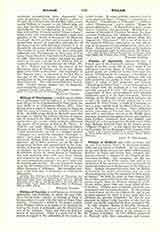

William of Digullevile (DEGULLEVILLE), a French poet of the fourteenth century. Nothing is known of his life, except that he was a monk in the celebrated Cistercian abbey of Chalis. Three allegorical poems are attributed to him with some certainty: “Pelerinage de vie humaine”, a description of a journey to Paradise, composed between 1330 and 1332, revised by the author in 1355; “Pelerinage de fame”, a vision of hell, purgatory, and heaven; “Pelerinage de Jesus-Christ”, a verse transposition of the Gospel with the addition of a few allegories, probably composed in 1358. We possess numerous manuscripts of these poems adorned with splendid miniatures, said to be the finest ever made. Several editions of the fifteenth and sixteenth centuries do not give the original text of the author, but a text amended by Peter Virgin, a monk of Clairvaux, or even a prose version made by John Gallopes, at the request of the Duchess of Anjou. These allegorical poems, containing not less than thirty thousand lines, met with a tremendous success in the Middle Ages, and were circulated throughout France and England. John Lydgate translated them into English, and Chaucer put a few passages into English verse, while John Bunyan imitated them in his famous poem, “Pilgrim’s Progress”. A new edition has been made by Stürzinger for the Roxburghe Club, London, 1893.

